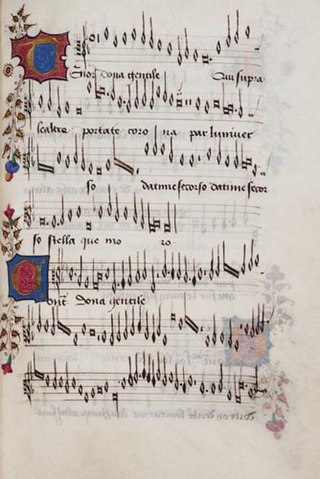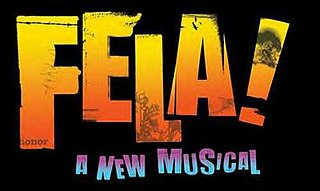Related Research Articles

Musical composition can refer to an original piece or work of music, either vocal or instrumental, the structure of a musical piece or to the process of creating or writing a new piece of music. People who create new compositions are called composers. Composers of primarily songs are usually called songwriters; with songs, the person who writes lyrics for a song is the lyricist. In many cultures, including Western classical music, the act of composing typically includes the creation of music notation, such as a sheet music "score", which is then performed by the composer or by other musicians. In popular music and traditional music, songwriting may involve the creation of a basic outline of the song, called the lead sheet, which sets out the melody, lyrics and chord progression. In classical music, orchestration is typically done by the composer, but in musical theatre and in pop music, songwriters may hire an arranger to do the orchestration. In some cases, a pop or traditional songwriter may not use written notation at all and instead compose the song in their mind and then play, sing or record it from memory. In jazz and popular music, notable sound recordings by influential performers are given the weight that written or printed scores play in classical music.

The American Society of Composers, Authors, and Publishers (ASCAP) is an American not-for-profit performance-rights organization (PRO) that collectively licenses the public performance rights of its members' musical works to venues, broadcasters, and digital streaming services.

Broadcast Music, Inc. (BMI) is a performance rights organization in the United States. It collects blanket license fees from businesses that use music, entitling those businesses to play or sync any songs from BMI's repertoire of over 22.4 million musical works. On a quarterly basis, BMI distributes the money to songwriters, composers, and music publishers as royalties to those members whose works have been performed.
Copyrights can either be licensed or assigned by the owner of the copyright. A copyright collective is a non-governmental body created by copyright law or private agreement which licenses copyrighted works on behalf of the authors and engages in collective rights management. Copyright societies track all the events and venues where copyrighted works are used and ensure that the copyright holders listed with the society are remunerated for such usage. The copyright society publishes its own tariff scheme on its websites and collects a nominal administrative fee on every transaction.
A performance rights organisation (PRO), also known as a performing rights society, provides intermediary functions, particularly collection of royalties, between copyright holders and parties who wish to use copyrighted works publicly in locations such as shopping and dining venues. Legal consumer purchase of works, such as buying CDs from a music store, confer private performance rights. PROs usually only collect royalties when use of a work is incidental to an organisation's purpose. Royalties for works essential to an organisation's purpose, such as theaters and radio, are usually negotiated directly with the rights holder. The interest of the organisations varies: many have the sole focus of musical works, while others may also encompass works and authors for audiovisual, drama, literature, or the visual arts.
A royalty payment is a payment made by one party to another that owns a particular asset, for the right to ongoing use of that asset. Royalties are typically agreed upon as a percentage of gross or net revenues derived from the use of an asset or a fixed price per unit sold of an item of such, but there are also other modes and metrics of compensation. A royalty interest is the right to collect a stream of future royalty payments.

Andrew Lippa is an American composer, lyricist, book writer, performer, and producer. He is a resident artist at the Ars Nova Theater in New York City.
Music on hold (MOH) is the business practice of playing recorded music to fill the silence that would be heard by telephone callers who have been placed on hold. It is especially common in situations involving customer service.
Music licensing is the licensed use of copyrighted music. Music licensing is intended to ensure that the owners of copyrights on musical works are compensated for certain uses of their work. A purchaser has limited rights to use the work without a separate agreement.
Performing rights are the right to perform music in public. It is part of copyright law and demands payment to the music's composer/lyricist and publisher. Performances are considered "public" if they take place in a public place and the audience is outside of a normal circle of friends and family, including concerts nightclubs, restaurants etc. Public performance also includes broadcast and cable television, radio, and any other transmitted performance of a live song.

Music publishing is the business of creating, producing and distributing printed musical scores, parts, and books in various types of music notation, while ensuring that the composer, songwriter and other creators receive credit and royalties or other payment. This article outlines the early history of the industry.
A music supervisor is a person who combines music and visual media. According to The Guild of Music Supervisors, a music supervisor is “a qualified professional who oversees all music related aspects of film, television, advertising, video games and other existing or emerging visual media platforms as required.” In the musical theatre industry, a music supervisor is often responsible for managing a team of music directors working on any number of musical productions. In visual productions, the music supervisor usually works with the directors, writers or producers to choose which songs are best suited for the scenes.
Public domain music is music to which no exclusive intellectual property rights apply.
Production music is recorded music that can be licensed to customers for use in film, television, radio and other media. Often, the music is produced and owned by production music libraries.
Music Law refers to legal aspects of the music industry, and certain legal aspects in other sectors of the entertainment industry. The music industry includes record labels, music publishers, merchandisers, the live events sector and of course performers and artists.
Grand rights is a type of music licensing, specifically covering the right to perform musical compositions within the context of a dramatic work. This includes stage performances such as musical theater, concert dance, and arrangements of music from a dramatic work.

Fela! is a jukebox musical with a book by Bill T. Jones and Jim Lewis, based on music and lyrics by the late Nigerian singer Fela Kuti, with additional music by Aaron Johnson and Jordan McLean and additional lyrics by Jim Lewis. It is based on events in the life of groundbreaking Nigerian composer and activist Fela Anikulapo Kuti. It portrays Kuti in the days when he was the target of 1,000 government soldiers assigned to end his public performances at the legendary Lagos nightclub The Shrine.

Music Reports provides music rights licensing, administration, royalty accounting, and software development and hosting. Music Reports operates the largest registry of worldwide music rights and related business information.

United States v. American Society of Composers, Authors and Publishers (ASCAP) et al., No. 09-0539, 2010 WL 3749292, was a United States Court of Appeals case involving copyright liability for third-party vendors that provide online music download services. In particular, the Second Circuit ruled that music downloads do not constitute public performances, upholding the district court's decision and consequently preventing ASCAP from claiming higher royalty fees from Yahoo! and RealNetworks for downloaded music. However, the Second Circuit disagreed with the district court's method of fee assessment and remanded the case for further proceedings. ASCAP appealed the decision and requested a writ of certiorari for judicial review in the Supreme Court.
References
- 1 2 Stein, Tobie S.; Bathurst, Jessica Rae (September 30, 2008). Performing Arts Management: A Handbook of Professional Practices - Tobie S. Stein, Jessica Bathurst - Google Books. Allworth. ISBN 9781581156508 . Retrieved May 17, 2012.
- ↑ "Welcome to ASCAP. The worldwide leader in performance royalties, service and advocacy for songwriters, composers and music publishers". Archived from the original on January 18, 2012. Retrieved March 21, 2011.
- ↑ "BMI, music royalty, music publishing, music licensing, songwriter, copyright, composer". BMI.com. May 11, 2012. Retrieved May 17, 2012.
- ↑ "Rodgers & Hammerstein Organization :: Home". Rnh.com. Retrieved May 17, 2012.
- ↑ "Licensing: Common Licensing Terms". ASCAP. Retrieved May 17, 2012.
- ↑ "U.S. Copyright Office - Dramatic Works". Copyright.gov. September 11, 2001. Retrieved May 17, 2012.
- ↑ "Learn from the past, create the future - The arts and copyright" (PDF). www.wipo.int. World Intellectual Property Organization. 2007.
- ↑ Itzkoff, Dave (November 9, 2010). "'Fela!' Is Sued for Copyright Infringement - NYTimes.com". Artsbeat.blogs.nytimes.com. Retrieved May 17, 2012.
- ↑ Amelia Hill (November 9, 2010). "Fela! musical is sued by biographer | Music". The Guardian. Retrieved May 17, 2012.
- [Bloom, Ken. Broadway, its history, people, and places: an encyclopedia. Taylor & Francis Publishing]